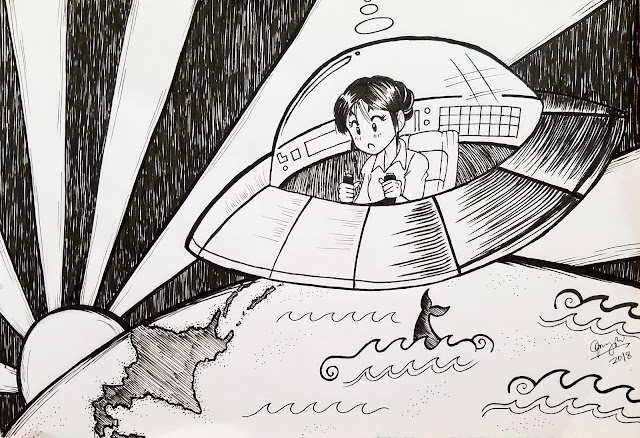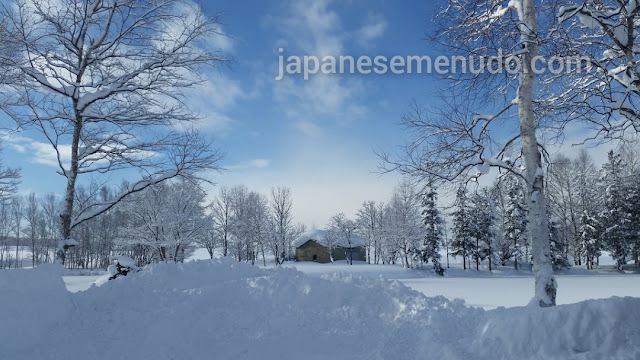Moving to Japan: Is it Worth it?
Japan has always been one of the most popular destinations around the world. To the Japanimaniacs, let's face it: we all dreamed of living in Japan someday, too. That's because we think that all the fancy Japanese traditions, cultures, anime, J-pop, J-Rock, J-drama, and everything we see from the media will finally be a part of our lives the moment we step into this country and hopefully find a local partner, get married, and live there forever.
...I wish it would be that way! 😅
Now on my fifth year living in the country (and engaged to a wonderful Japanese man), I often wondered where those dreams went---that's because most of the things I thought would happen in my life living in Japan never really happened at all!
The five stages of life in Japan
I categorized five stages of my life as a foreigner living in Japan. These dramatically changed the way I see life in general and my life in Japan as an outsider (OUCH! That word doesn't sound nice at all, but this is literally the meaning of the the term 'gaijin' in Japanese).
Stage One: The Japanese Dream
The Japanese Dream is an ambition to live and work in Japan for the rest of one's life. It's like the American Dream, you know what I'm sayin'? (Relax, I made up this term myself; you wouldn't find this word in the dictionary.) Like most Japan fans, my Japanese dream bloomed from the love of anime, Japanese culture, food, and architecture. I started dreaming about Japan at the age of 9, when I was designing Japanese school uniforms inspired by the 90s shoujo anime, Sailormoon. Since then I often told myself and my friends, "When I grow up, I'm gonna live in Japan!" (And then laughed hard because I thought it was the biggest joke I ever told myself!)
But after 21 years, who would've thought I'd actually move to Japan?
Thanks to my host family who accommodated me to stay at their place in Chiba Prefecture for 2 weeks back in 2014. They were my students when I worked as an online English teacher in Manila on the same year. They were so pleased that my student's wife, Yuko-san, invited me to visit Japan and experience the life there. They also helped me look for a job when I returned to Manila, got the job the following year, and the rest is history.
Stage Two: The Honeymoon
Of course, coming to Japan as a tourist is such an amazing experience. But coming to Japan to live for a long period of time (if not forever) would be even better---I thought! 😂
But as we all know, living in a foreign country would mean leaving our home country, family, friends, pets, some valuable things, our favorite local food, a huge part of our language (especially if English is not your native tongue), and in short, our comfort zone. But what the heck? We can compromise! 😎
The moment I landed in Hokkaido was like one of the best days of my life. It was such a unique experience. It was my first time seeing snow, foreign trees (yeah, I noticed that), different architecture, and so on. Every time I woke up it felt like a refreshing day. Everything was an opportunity to experiment, feel, learn, and observe. Those were the days until...
Stage Three: The Culture-Shock
It was on the fourth month of my first year when my world suddenly paused. I just realized I have been eating, sleeping, traveling, and working on my own---EVERY SINGLE DAY. It would have been great at first because freedom was at my feet. I lived with my family for 30 years, didn't have my own space, and I was in 'prison' under my Dad's house laws. And now I am free as a bird.
Unfortunately I felt like a bird in a cage. Because I was foreign, nobody talked with me, made friends, nor even a neighbor cared to knock on my door and welcome me in that town I first lived. Perhaps it could've been different if I lived in friendly Osaka City, or got lucky to be assigned near my host family's place. But I was in Kyogoku, a beautiful landscape with such wonderful nature yet cursed with such hostility among the residents. Naaah, I was kidding. It's not that they're mean; Japanese people are just not naturally open to foreigners, especially those living in the countryside because of lack of awareness, exposure, and English language ability. Through these experiences, it later evolved into the next stage which is...
Stage Four: The Struggle
Keeping
a positive mindset and a busy lifestyle can maintain one's
sanity---literally. But it's not enough when you're dealing with life
alone without any human support. Yes, we may talk with colleagues once in a while, have an online video call with family
members and friends, and the itinerary goes on. But people will be busy, and we cannot depend on them all the time.
Another struggle is missing the food from our home country. Maybe to some, it's not a big deal. But as a Filipino, eating local food for me is important. The lack of ingredients here in Japan makes it almost impossible to do some of my favorite foods like halo-halo, manggang hilaw, tinapang bangus, and the list goes on. Luckily, there are still a few available ingredients around that are local and imported, but most of them are really expensive.
There's also the inability to use my native language, Tagalog. And although I can speak English fluently and have a basic level of Japanese conversation, speaking in a foreign language doesn't make it natural and it makes me homesick. Do you know that speaking in English and Japanese, like forever, makes me crazy?
And the most difficult for me is enduring the four-season environment. In my home country, the Philippines, we only get two seasons all year (summer and rain), and our average temperature ranges from 20 degrees Celcius the lowest and 40 degrees the highest (and this goes on for a long time). Seasons in Hokkaido are short, but winter is the longest, about half a year, with the lowest temperature about -17 degrees Celcius. An average Filipino cannot handle that cold, and sudden changes of seasons make us literally sick!
Stage Five: Survival
The last stage would be the desire to withstand everything during tough times. It will even depend if the survival is successful or not. Some overseas workers endure the struggle for a certain period of time; and when exhaustion comes they decide to quit and return to their home countries. Others, like me, commit to strength and persistence for a reputable reason. We all have different reasons after all. But the moment of survival will always strike again and again.
So those are the stages, folks! I have to say it's a never ending process. In fact, in my personal experience, stages 3, 4, and 5 are repetitive. So the question is,
Is it worth it?
Personally, yes. My decision to move to Japan changed my life forever. Since I moved here, I Iearned the value of true independence, saving money, understanding other cultures, embracing Japanese culture, cultural differences, acceptance, contentment, minimalism, self-discipline, cleanliness, and the list goes on. Of course, it may depend on an individual. Some people regretted their choice to move here, others are happy to be here. I guess it's a matter of patience and endurance.
If you have some questions related to moving to Japan, please write your comments below and I'd be happy to reply!








Thank you for sharing, this boosts my courage. I am at the moment of thinking about taking the lead to try and move to Japan after my university studies, I understand the recent Covid issue might make things difficult going forward but I am not giving up!
ReplyDeleteI have been to Japan two times in the past, the first time being a short exchange experience in High school that set my love for Japan. What do you think are the necessary things must you have ticked on the list to take the big step to move there? Job, cost, location, time, etc.
Hi, Sam! Thanks for the time to read and comment in this blog! First of all, you need to have a complete decision to move to Japan. There should be no doubts, no second thoughts whatsoever. Moving to another country as I have mentioned in the article is no joke and requires full dedication as it will cost you a lot of difficult encounters (which is totally normal).
DeleteAnother thing is you need to be financially prepared especially during these desperate time. The pandemic isn't over around the world, and sadly it doesn't exempt Japan. It is still in caution and still observes strict policies especially those coming from foreign countries. There are no definite considerations about opening boundaries to immigrants, tourists, and students yet, so you need to inquire about this to the immigration or the school you plan to enroll. I have no idea about the cost, etc but I would suggest you ask the school you're going to be involved in. I hope this helps!
ありがとうございます for sharing your experience! I'm from Brazil and I want to move to Japan.
ReplyDeleteMy grandfather is Japanese and sometimes I feel more Japanese than Brazilian.
For work, how is the situation for foreigners now?
Sorry if my English is not very well!
Hello, Eli! Thanks for your time in reading and leaving a comment!
DeleteRegarding job hiring, there are certain companies nationwide that are open to foreigners however it may be very strict at this moment regarding applications outside Japan. For now, they are only hiring those who are already in Japan. Perhaps you should wait a bit more and inquire to companies in Japan regarding this matter. I hope you'll soon find what you're looking for!
Thanks it is very helpfulinformation
ReplyDeleteYou're welcome, Pralhad! And thanks for dropping by!
DeleteHello! I am actually considering studying a masters degree in Japan and debating the idea if I should leave my country after I finish my studies. But there are things that worry me, social life in Japan as well as having time for myself. Did you had those when you finally arrived to rhe country? If not, what did you had to do to actually get those things? I want to live in Japan but I’ve seen videos, forums and blogs around many parts about the good and the bad but I still can’t decide. Any thoughts that you can give me regarding this? Thank you in advance!
ReplyDeleteA good Read 🙂 I like the drawing too. Personally I think I would love it there but that would be if I can speak their language very very fluently which I don't.
ReplyDeleteThanks, Rufen! I guess it was out of 'no choice' that I had to move to Japan due to the need of a stable job. But for my experience, it was worth a try and I'm staying here for good. I do hope you get to experience the real Japan someday!
DeleteI stumbled upon this blog while googling "how to surive winter in Hokkaido". Hello Japanese menudo, I am Leyza from the Philippines too and also living in Sapporo City for five months now as ALT. Thank you for sharing some winter insights on your blog.
ReplyDeleteThank you for your comment, Leyza! I'm glad this article helped you! I wrote another blog about some creative ways you can do in winter! It's entitled, "Winter Depression in Hokkaido". Please check it out on this link! https://www.japanesemenudo.com/2024/01/winter-depression-in-hokkaido-and-how.html
Delete